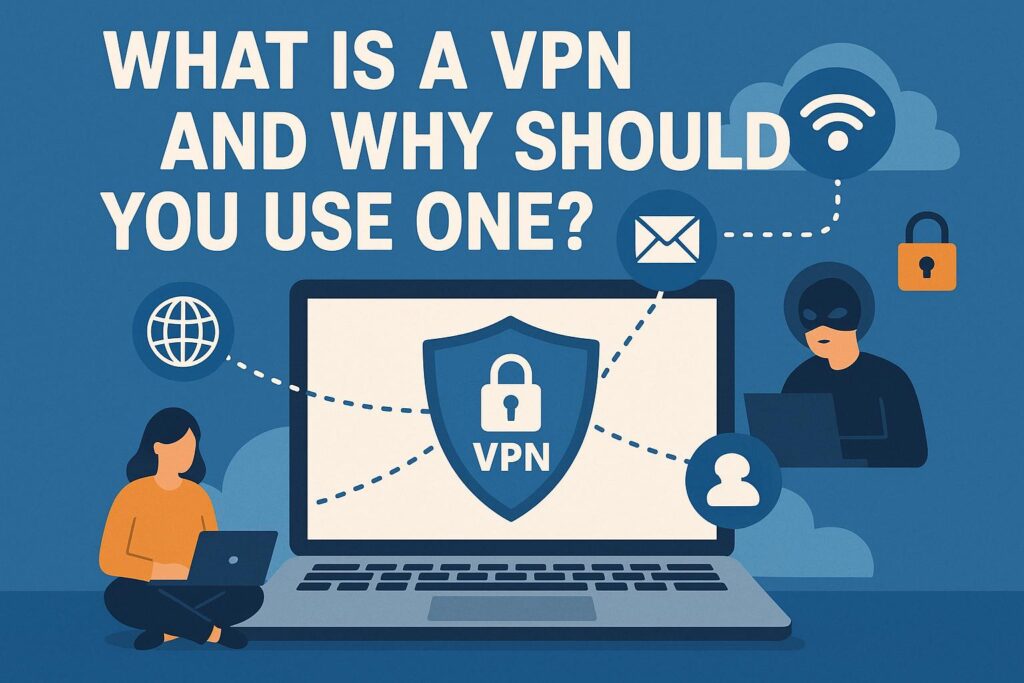In today’s interconnected world, privacy and security have become paramount. Whether you’re browsing the web at home, working remotely, or connecting to public Wi-Fi, your online activity is constantly at risk from cyber threats, data tracking, and censorship. One powerful tool to protect yourself online is a VPN, or Virtual Private Network.
What is a VPN?
A VPN is a secure, encrypted connection between your device and the internet. It works by routing your online traffic through a private server, masking your IP address and making your online actions much harder to track. This process helps ensure your data remains private, even on unsecured networks.
When you use a VPN, your internet service provider (ISP) and other third parties can’t easily see your browsing activity. Instead, they see the VPN server as the source of your traffic, giving you anonymity and privacy.
Why Should You Use a VPN?
Here are the key reasons to use a VPN:
1. Protect Your Privacy
Your personal information, location, and browsing habits can be monitored by ISPs, advertisers, and hackers. A VPN encrypts your data, making it nearly impossible for anyone to intercept or track your activity.
2. Stay Safe on Public Wi-Fi
Public Wi-Fi networks, like those in cafes or airports, are often unsecured. Cybercriminals can exploit these networks to steal sensitive information. A VPN shields your data, ensuring safe browsing in public spaces.
3. Bypass Geo-Restrictions
Many websites and streaming services limit content based on your location. By connecting to a VPN server in another country, you can access region-restricted content and enjoy more internet freedom.
4. Avoid Censorship
In some countries, certain websites or social media platforms are blocked. VPNs allow you to bypass these restrictions by making it appear as if you’re browsing from a different location.
5. Secure Remote Work
For businesses and remote workers, VPNs provide a secure connection to company networks, protecting sensitive documents and communications.
Choosing the Right VPN
When selecting a VPN, consider factors such as speed, server locations, privacy policies, and ease of use. Paid VPN services generally offer stronger security, faster speeds, and better reliability than free ones.
Conclusion
A VPN isn’t just for tech enthusiasts—it’s an essential tool for anyone who values their privacy and security online. By encrypting your data and masking your location, a VPN empowers you to browse the internet freely, securely, and without compromise.
FAQ
Q1: What is a VPN?
A VPN (Virtual Private Network) is a service that encrypts your internet connection and hides your IP address, providing privacy and security online.
Q2: How does a VPN work?
It routes your internet traffic through a secure, encrypted tunnel to a remote server, masking your real location and IP address.
Q3: Is using a VPN legal?
In most countries, VPN usage is legal. However, it may be restricted or regulated in certain regions. Always check local laws before using one.
Q4: Do VPNs make me completely anonymous?
While a VPN improves privacy, it does not guarantee complete anonymity. You should still follow safe browsing practices.
Q5: Can a VPN improve internet speed?
Usually, VPNs may slightly reduce speed due to encryption, but in some cases, they can bypass ISP throttling and improve performance.
Q6: Is a free VPN safe to use?
Free VPNs often come with limitations and risks, including data logging. Paid VPNs are generally more reliable and secure.
Q7: Can I use a VPN on my phone?
Yes, VPNs work on smartphones, tablets, laptops, and desktop computers. Many VPN providers offer dedicated mobile apps.
Q8: Does a VPN protect me from hackers?
A VPN can protect your data from interception, especially on public Wi-Fi, but it does not replace antivirus or firewall protection.



